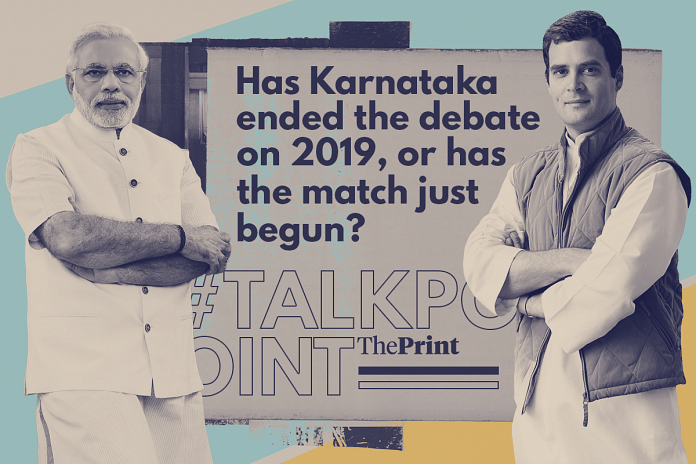BJP has emerged as the largest party in Karnataka with 104 seats. Whether or not it goes on to form the government, the result has bolstered the party’s cadre. On the other hand, the Congress may have secured only 78 seats, but its vote share is 2 per cent higher than that of the BJP.
ThePrint asks: Has Karnataka ended the debate on 2019, or has the match just begun?
Karnataka shows Congress must forge regional alliances to fight BJP
 Apoorvanand
Apoorvanand
Professor of Hindi, University of Delhi
I think 2019 is now a game wide open. What the results are telling the opposition, especially the Congress, is that there isn’t a vote surge for the BJP. The Congress had a higher vote share in Karnataka than the BJP. The dream of a Congress-mukt Bharat is now over.
The results should also make the Congress realise that there are no shortcuts. Rather than going for opportunistic and populist mandates, like giving the Lingayats the status of separate religion, they have to take the difficult route: They must talk about their idea of India.
Congress must keep talking to regional forces, however minor they might appear, and forge alliances with them. The magnanimity it showed after the Karnataka election, the party should have shown before. They could have formed a pre-poll alliance and secured the state.
It is only a broad coalition that will, if not defeat, create a strong opposition against the BJP. They can very well offer a tough contest to the BJP.
Karnataka also demonstrates that the BJP will go to any extent to mobilise Hindus. It will never give up its polarisation politics despite the expectations of our gentry and civilised commentariat. The PM will stoop to any low to ensure he remains attractive to the divisive segment, because he has nothing else to offer.
The BJP will continue on this path because it believes such an approach appeals to the younger section of Hindus. What we are likely to witness in 2019 is a more bitterly divisive political discourse. It is the duty of the Congress and other parties to make an alliance of civilised voices.
No combination of opposition parties can match BJP’s invincibility in 2019
 Seshadri Chari
Seshadri Chari
Former editor, Organiser
The 2018 Karnataka election result has established beyond doubt that the Narendra Modi-Amit Shah combine is invincible, and that no coalition of opposition parties can match the BJP’s strength.
The BJP has won almost all the elections held since 2014, and the NDA holds power in 21 states (against seven when Modi became PM), which account for more than 70 per cent of the population and 61 per cent of the seats in the Lok Sabha, with nearly forty seven parties in its fold.
The Congress just holds two states and a union territory, while four are governed by other rival parties of the BJP.
The challenge before opposition parties is not just to form a coalition, fight elections together and win a two-third majority, but also to agree on one leader. This appears to be an impossible task, more so after the Karnataka results, where the Congress was seen falling at the feet of bête noir JD(S) to keep the BJP out of power.
With regional parties and leaders gaining strength, the Congress will be reduced to playing second fiddle and cede leadership to a stronger contender.
A clear win for the BJP with an absolute majority in Karnataka would have been a fairytale ending. But the present drama unfolding in Karnataka should provide some good lessons to the BJP in the run-up to 2019. For each and every step to success, there are a dozen snakes to confront.
In 2019, BJP will neither be a pushover nor a walkover
 Sandip Ghose
Sandip Ghose
Political Commentator
The political mood of the country has been characterised by major bipolar swings in the last four years. When each election, from panchayat to parliamentary by-polls, is elevated to the level of a referendum on Modi, depending on the outcome, the sentiments have to oscillate between waves of euphoria and troughs of depression.
The Congress was obviously on a high after Gujarat, where it was able to give incumbent BJP a serious run for money. Although it narrowly missed the jackpot, the achievement was still big to celebrate the coronation of Rahul Gandhi as party president. So far, things had moved according to a script.
The next stop was Karnataka, where the Congress had a lot going for it: A relatively low level of anti-incumbency against the chief minister; the BJP organisation in the state was not the most fit and agile in the absence of a strong leadership; Yeddyurappa had his share of old baggage; anti-BJP sentiments in the south, especially in neighbouring Andhra Pradesh, had a spillover effect on the state. The setting seemed just right to step up the ante.
Karnataka could have become the springboard for launching Rahul Gandhi as the Congress’ prime ministerial candidate for 2019. However, they probably overplayed their cards.
It is game-over for the Congress in 2019 if it harboured hopes of leading the battle from the front. It can only remain in the race if it is willing to do business with other opposition parties as an equal partner rather than the numero uno.
While commentators have quickly changed the hashtag from #ModiNotInvincible to #ModiUnbeatable much can change between now and 2019. What can be predicted with certainty is, in 2019, the BJP will neither be a “pushover” nor will it have a “walkover” if the opposition can get its act together.
Party that wins a state has better chances in 2019 elections, if held soon
 Sanjay Kumar
Sanjay Kumar
Director, Centre for the Study of Developing Societies
The verdict of an election in one state does have an impact on the morale of party leaders and workers, and on the way a party prepares for a subsequent election. However, the results of one election do not necessarily affect those of another.
The parties that win state assembly polls do have a chance of performing well in the Lok Sabha elections if the latter are held sooner, and, in that respect, the verdict of Karnataka adds to the strength of the BJP and weakens the Congress’ prospects in 2019.
The Karnataka results will change the nature of debate around the 2019 elections. If the Congress had won these elections, one would have talked about its revival and the possibility of the party alone putting up a challenge to the BJP in 2019, and its decreasing dependence on regional parties.
But these results have brought to the forefront the urgent need for the formation of a non-BJP front if the party is to be given a challenge in 2019. Again, the discussion will be on the leadership of Rahul Gandhi and his ability to pose a challenge to Narendra Modi.
Indians have a keen interest in two things — cricket and elections. They watch cricket matches till the last ball is bowled, even if that last ball is unlikely to change the result. Similarly, the debate on 2019 elections will continue till the last vote is counted for the election.
Recent history suggests winning Karnataka is followed by losing Centre
 Shivam Vij
Shivam Vij
Contributing editor, ThePrint
In 1999, elections to the Karnataka assembly were held around the same time as the general elections. The BJP emerged as the single largest party at the Centre. In Karnataka, the Congress swept the Lok Sabha and the Vidhan Sabha alike.
In 2004, the BJP emerged as the single largest party in the Karnataka state assembly but the Congress-led UPA-I formed government at the Centre. In 2008, the BJP was once again the single largest party, but Dr Manmohan Singh retained the PM’s chair in 2009.
In 2013, Narendra Modi campaigned for the BJP but the Congress still swept the state. Modi went on to become Prime Minister the next year.
In other words, the BJP emerging as single largest party in Karnataka, in striking distance of a majority, is no sign the party will be back in power at the Centre a year from now. It may just be a coincidence, but recent history actually suggests that winning Karnataka is followed by losing the Centre.
We tend to over-estimate the impact of one election on future elections. One week is a long time in politics. A year is eternity. In three months, other issues and stories will take over our imagination and the Karnataka election will be forgotten. Moreover, people vote differently in state and national elections.
However, there could be one fallout of the Karnataka elections. If the BJP forms government by hook or by crook, it could push the JD(S) and the Congress into a pre-poll alliance for 2019. That could spell disaster for the BJP in the Lok Sabha elections.
Compiled by Deeksha Bhardwaj, journalist at ThePrint.




Santosh Hegde
Sir, what about Manipur, Goa and Meghalaya?. According to my view, if this is discretion of governor then it is wrong. Why?, because, he may be favore of any party as it seems of constitution.
To short out this, there must be proper guidelines that should be followed in each state. This is unconstitutional if whatever happened in Manipur, Goa and Meghalaya, happens opposite in Karnataka.
Undoubtedly, all machineries– raid by CBI to threaten MLAs, horse-riding, poaching, level allegation, will all be used to prove majority.